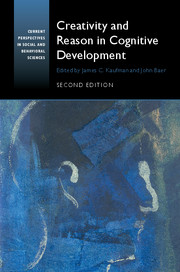Book contents
- Frontmatter
- Dedication
- Contents
- List of Contributors
- Acknowledgments
- 1 Creativity, Reason and Cognitive Development: Ten Years Later
- SECTION ONE CREATIVITY AND REASON IN CHILDHOOD AND THE SCHOOLS
- SECTION TWO CREATIVITY AND REASON IN COGNITION AND NEUROSCIENCE
- SECTION THREE CREATIVITY AND REASON: INTERACTIONS AND RELATED CONSTRUCTS
- 14 Opening up Creativity: The Lenses of Axis and Focus
- 15 Creativity and Reason: Friends or Foes?
- 16 Creative Self-Beliefs: Their Nature, Development, and Correlates
- 17 Individual Differences in Intelligence, Personality, and Creativity
- 18 An Update on “Does Culture Always Matter”: For Creativity, Yes, for Deductive Reasoning, No!
- Author Index
- Subject Index
- References
16 - Creative Self-Beliefs: Their Nature, Development, and Correlates
from SECTION THREE - CREATIVITY AND REASON: INTERACTIONS AND RELATED CONSTRUCTS
Published online by Cambridge University Press: 05 February 2016
- Frontmatter
- Dedication
- Contents
- List of Contributors
- Acknowledgments
- 1 Creativity, Reason and Cognitive Development: Ten Years Later
- SECTION ONE CREATIVITY AND REASON IN CHILDHOOD AND THE SCHOOLS
- SECTION TWO CREATIVITY AND REASON IN COGNITION AND NEUROSCIENCE
- SECTION THREE CREATIVITY AND REASON: INTERACTIONS AND RELATED CONSTRUCTS
- 14 Opening up Creativity: The Lenses of Axis and Focus
- 15 Creativity and Reason: Friends or Foes?
- 16 Creative Self-Beliefs: Their Nature, Development, and Correlates
- 17 Individual Differences in Intelligence, Personality, and Creativity
- 18 An Update on “Does Culture Always Matter”: For Creativity, Yes, for Deductive Reasoning, No!
- Author Index
- Subject Index
- References
Summary
People's convictions about their own abilities and psychological characteristics are of crucial significance in regard to their actual functioning, including creativity. Historically, self-beliefs (which include aspects of self-efficacy, self-concept, and self-esteem) have most frequently been conceptualized from two different perspectives in psychology: (1) humanistic and neo-humanistic positive psychology and (2) cognitive and social-cognitive psychology. The first approach is strongly grounded in the works of Maslow (1958), Rogers (1954), and Fromm (1959) and was continued by Csikszentmihalyi (1997) and others (e.g., Richards, 2010). This approach often conceptualizes the formation of identity as a creative process, or, reciprocally, posits that creativity represents a mechanism of self-understanding, self-fulfillment, or self-actualization. The second approach, which encompasses Bandura's (1997) classic work, considers the process of acquiring knowledge about one's self as an activity that is largely cognitive and is conditioned by interactions with the social world. Other established approaches include educational perspectives focusing on the structure of self-concepts (e.g., Marsh, 1990), developmental approaches (Eccles, 1983), and cultural psychology approaches within the field of creativity (Glăveanu & Tanggaard, 2014).
The present chapter reviews and summarizes key data about the role and significance of self-beliefs about one's creativity (creative self-beliefs [CSB]), with a focus on the sociocognitive approach. Specifically, the purpose of this chapter is to articulate theories and research on CSB, and to outline possible relationships that may exist between a wide and heterogeneous range of facets of both CSB and creativity. We focus our review principally on little-c and mini-c creativity in children and adolescents, rather than on professional (Pro-C) or eminent (Big-C) creativity (Kaufman & Beghetto, 2009). Indeed, the significance of self-beliefs for “everyday” creativity (e.g., a child's creative thinking, solving everyday problems, tackling issues that require individual inventions) is truly intriguing: to what extent do children's, adolescents’, and adults’ convictions about their creative abilities influence their motivation to undertake creative activities? How are CSBs formed? How can CSBs be strengthened and why should they be supported? This chapter addresses these questions, among others.
Although we focus on everyday creativity, it is worth noting that eminent creativity may also suggest and inform inquiries about CSBs. For example, eminent individuals tend to be strongly convinced about their own creative abilities (Barron & Harrington, 1981), as a result of their successes and the feedback they obtain from their fields.
- Type
- Chapter
- Information
- Creativity and Reason in Cognitive Development , pp. 302 - 326Publisher: Cambridge University PressPrint publication year: 2016
References
- 58
- Cited by

